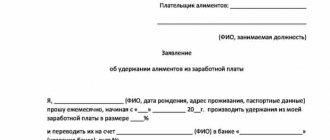The activities of the Federal Bailiff Service (FSSP) are aimed at ensuring compliance with the orders of judicial acts and other enforcement documents. When collecting alimony, the bailiff is obliged to: monitor the timeliness of transfers and the correctness of alimony calculations; apply enforcement measures to fulfill obligations if the payer evades responsibility; conduct a search for alimony debtor.
The recipient of deductions in favor of children may temporarily lose alimony income, and subsequently resume enforcement proceedings by filing a corresponding application.
The legislative framework
The main law regulating the activities of the FSSP is Law No. 229-FZ “On Enforcement Proceedings” dated October 2, 2007. The provisions on the suspension of enforcement proceedings by a bailiff (IP) are set out in Art. 40 of the Law.
The powers to suspend individual entrepreneurs are vested in:
- bailiff of the relevant department of the FSSP;
- Judicial authority.
The bailiff terminates the enforcement of alimony if:
Articles on the topic (click to view)
- Assignment of the right to claim under alimony obligations is possible
- Formula for calculating penalties and fines for alimony: sample
- What are the consequences of not paying child support in 2020?
- Criminal liability for non-payment of alimony under Art. 157 of the Criminal Code of the Russian Federation
- Is alimony from financial assistance withheld for vacation?
- Find out the debt by name from the bailiffs for alimony
- Reducing alimony debt over the past period
- the debtor dies, he is declared missing or dead in court;
- the payer takes part in hostilities as part of troops formed in accordance with the legislation of the Russian Federation;
- the alimony provider loses legal capacity;
- a claim is pending in court to defer collections and reduce the amount of payments;
- the payer's property is seized.
In these situations, the suspension is carried out unconditionally, but in some cases the bailiff is considering the need to terminate actions to forcibly collect alimony, for example:
- if the debtor is undergoing treatment in a hospital;
- when searching for the payer, recipient or property of the debtor;
- if the alimony provider undergoes conscription military service;
- when instructed to perform executive actions;
- if the claimant files a complaint about the inaction of the bailiffs.
In addition to the FSSP employee, enforcement proceedings are suspended by the court in the following cases (Article 39 of Law No. 229-FZ):
- challenging the bailiff's decision;
- if there is a statement of claim for release from seizure of property that has been foreclosed on under a writ of execution (IL);
- if the debtor is on a long business trip;
- when the debtor or bailiff asks for clarification of the provisions of the writ of execution, to determine the procedure for further actions.
Reasons for suspending the collection of funds for child support
The grounds for suspending the collection of alimony are provided for in Art. 39 and 40 of the law (hereinafter referred to as the law). In some cases, payments will be suspended unconditionally, and in other situations, the decision on this issue is left to the discretion of the judge or bailiff. Mandatory grounds include:
- recognition of the debtor as incompetent based on a court decision;
- participation of the payer in military conflicts as part of armed formations;
- similar participation of the claimant in wars (he needs to write an application for suspension);
- the debtor, who is a foreigner, lacks assets, the sale of which can be used to withhold alimony.
Situations to consider include:
- challenging a court decision that served as the basis for withholding amounts;
- filing demands to invalidate the alimony agreement;
- departure of the debtor for a long period due to a business trip;
- appealing a decision made during compulsory collection;
- application by the debtor or claimant with a request for clarification of the collection procedure;
- the payer is in a hospital;
- search for the alimony holder or his assets;
- the debtor's conscription service;
- an order to forcibly withhold alimony in another territory (for example, when the payer’s real estate is located in another region).
Withholding of alimony can be terminated either completely or partially (an example of the latter is the challenge of the recalculation of the monthly payment carried out by the bailiff - during the consideration of this issue).
The consequence of the adoption of the corresponding determination or resolution will be the impossibility of taking compulsory actions against the debtor. At the same time, he has the right to make payments voluntarily.
How to resume enforcement proceedings
Resumption is carried out by a “ruling” of the court if the reasons that led to the suspension are eliminated, for example, when the alimony provider returns from a business trip or is discharged from a medical institution, or when the complaint against the bailiff is withdrawn.
Despite the absence of direct instructions for filing an application to renew an individual entrepreneur (Article 440 of the Code of Civil Procedure of the Russian Federation), the most interested party - the recipient of alimony - is recommended to notify the bailiff that the reasons for the suspension have been eliminated. In practice, the payer either does not notify the FSSP employee at all about the possibility of resuming payments, or seeks to avoid liability for as long as possible.
Where to apply
If it is reliably known that the proceedings in the case were temporarily stopped at the initiative of the FSSP and there are no longer any obstacles to the resumption of the IP, the claimant must contact the department of the service that previously considered the case.
If the suspension occurred in accordance with a court order, you must apply to the court for renewal.
For how long is a decision to suspend enforcement proceedings made?
Expert opinion
Kuzmin Ivan Timofeevich
Legal consultant with 6 years of experience. Specializes in the field of civil law. Member of the Bar Association.
The duration of suspension of proceedings under a writ of execution will depend on the reason that prompted the plaintiff, defendant or bailiff to file an application for suspension of enforcement proceedings.
- By decision of the bailiff
After the reasons for the defendant’s failure to pay alimony are clarified or the court explains and clarifies the content of its decision to collect alimony to the bailiff, it resumes enforcement proceedings, notifying all participants.
- At the request of the recipient of alimony
After the court considers the claim to change the amount of alimony and makes a decision to satisfy or refuse, the resulting decision will become the basis for the resumption or opening of new enforcement proceedings by the bailiff.
- According to the payer's application
Enforcement proceedings may be suspended until the payer returns from a business trip or until the end of his military service. In case of incapacity for work and registration of disability, enforcement proceedings will be resumed from the moment the benefit or pension is assigned, from which, according to the law, alimony can be withheld.
If the payer is declared incompetent by the court, his interests in the judicial authorities will be represented by a guardian, also appointed by a court decision.
Contents and form of application for renewal of individual entrepreneurs
The document is not a statement of claim, but in form and content it resembles a claim. Before drawing it up, you need to make sure that there are no more reasons to suspend the individual entrepreneur and collect evidence.
The structure of the statement is as follows:
- In the upper right corner is the document header. The top line is the name of the body where the claim is filed: court, department of the FSSP. Next, indicate the address of the organization, the applicant’s full name and place of residence, the full name and coordinates of the interested person.
- Name of the document: “Application for the resumption of enforcement proceedings.”
- Content. It indicates here who and when the IL was issued, on the basis of which enforcement proceedings were initiated; the reason for the suspension is specified; the date of termination of collections is indicated.
- Please restore your IP.
- If necessary, indicate the details of the bank or post office for making the transfer.
- List of applications. It includes copies of documents: basis for starting an individual entrepreneur; resolution on suspension of individual entrepreneurs; evidence that there are no more reasons to terminate the enforcement.
- Signature and date.
This is important to know: Application for alimony in a fixed amount: sample form 2020
Completed sample application to the FSSP:
Form of application submitted to the court:
There is no need to pay a state fee when submitting an application.
As a rule, the case file contains the executive document on the basis of which enforcement proceedings were initiated. If the document was returned to the applicant, it must be attached to the file.
How payments are terminated in the event of the death of the subjects of alimony relations
In the event of the death of the recipient of alimony (most often the recipient is the mother), the child is placed under the guardianship of a person appointed by the court. The recipient becomes the guardian, and the payer continues to make payments on the basis of the current enforcement proceedings, in which adjustments are made in relation to the recipient.
With the death of a child, child support payments cease completely.
If the alimony payer dies, a decision is made to suspend enforcement proceedings until the inheritance left by the payer is formalized. Even if his property was inherited by other people by will, the child for whom the payments were made has the right to inherit part of the property as a disabled heir of the first turn.
1.1. What are the grounds for suspension? Are you a debtor or a claimant?
2.1. To resume enforcement proceedings, contact the bailiff. With regard to debt collection and determining its size, you can give advice if you have more complete information.
2.2. Write a statement to the bailiff to initiate a lawsuit. production.
3.1. You need to appeal the bailiff's decision, then demand to familiarize yourself with the enforcement proceedings, write a complaint about the inaction to the senior bailiff and the prosecutor's office.
Federal Law of 02.10.2007 N 229-FZ (as amended on 03.08.2018) “On Enforcement Proceedings” (as amended and additionally, entered into force on 03.09.2018) Article 121. Challenging decisions of officials of the bailiff service , their actions (inaction)
1. Resolutions of the bailiff and other officials of the bailiff service, their actions (inaction) to execute the writ of execution may be appealed by the parties to the enforcement proceedings, other persons whose rights and interests are violated by such actions (inaction), in the order of subordination and challenged in a court.
2. The resolution, actions (inaction) of the chief bailiff of the Russian Federation may be challenged in court.
3. A refusal to challenge a bailiff can be appealed only by the person who filed the challenge.
Expert opinion
Kuzmin Ivan Timofeevich
Legal consultant with 6 years of experience. Specializes in the field of civil law. Member of the Bar Association.
The satisfaction of the bailiff's challenge cannot be appealed. 4. The decision to collect the enforcement fee may be challenged in court.
4.1. You can, but you will have to prove that the court order is fake. And only after you prove this will they make a decision regarding enforcement proceedings.
4.2. Yes! According to paragraph 2 of part 1 of Article 39 of the Federal Law of October 2, 2007 N 229-FZ (ed.
dated 08/03/2018) “On Enforcement Proceedings”, enforcement proceedings may be suspended by the court in the manner established by the procedural legislation of the Russian Federation and this Federal Law, in whole or in part, in the following cases: 1) challenging an executive document or a judicial act on the basis of which the executive document was issued . If my answer was useful to you, please rate it!
5.1. Dear Oksana! Firstly
, You cannot “suspend” the writ of execution, but you could pick up the writ of execution from the bailiff and keep it at home.
By this action, you did not relieve the father of your child from the obligation to pay you monthly child support in the amount specified in this writ of execution. So you have the right to present it to the Bailiff Service with an Application in accordance with Federal Law No. 229-FZ “On Enforcement Proceedings”, and after the initiation of enforcement proceedings, you have the right to contact the bailiff about the calculation of alimony debt from the father of your child on the basis Article 113 of the Family Code of the Russian Federation.
Secondly
, you also have the right to file a claim with the magistrate to increase the amount of alimony collected from the father of your child, since you now have 2 minor children. Good luck to you.
Consideration of the application and legal consequences
The court decides on the resumption of enforcement proceedings within 10 days (Article 440 of the Code of Civil Procedure of the Russian Federation). Interested parties are notified about the date of consideration of the application: the bailiff, the alimony provider, the recipient of payments. The failure of these persons to appear is not an obstacle to the consideration of the document. As a result, the judge makes a ruling:
- resume enforcement proceedings if the evidence provided is convincing;
- refuse renewal unless there are compelling reasons.
If one of the parties disagrees with the verdict, the decision can be appealed.
When sending an application to the FSSP, it must be transferred to the responsible bailiff within 3 days . The bailiff considers the application within 10 days , after which he makes a decision:
- on the renewal of individual entrepreneurs;
- about refusal;
- on the partial renewal of individual entrepreneurs.
The document is sent by mail indicating the address of the claimant. In the future, the determination will be sent to the addressee no later than 1 day from the moment of receipt at the post office (clause 2, article 24 of Law No. 229-FZ).
Suspension of alimony can be carried out by a court or by order of a bailiff. According to the law, the judicial authorities and the bailiff service resume enforcement proceedings automatically as soon as the reasons for suspension disappear. However, information about the abolition of grounds for termination of payments may be received with a significant delay, so the claimant has the right to legally file an application for the restoration of enforcement proceedings, supporting the information presented with evidence.
FREE CONSULTATIONS are available for you! If you want to solve exactly your problem, then
:
- describe your situation to a lawyer in an online chat;
- write a question in the form below;
Application to court
In some cases, before contacting the bailiff, you need to obtain a court decision to terminate the enforcement case. The application is submitted to the court at the location of the FSSI.
Please note: when filing a claim in court, the state fee is not withheld.
The statement notes information previously provided.
After 10 days from receiving the application, the judge makes a decision. The parties to the process (payer, alimony recipient and bailiff) are invited to the court hearing to give explanations. In this case, the failure of one of the parties to appear does not prevent the decision from being made.
Based on the results of consideration of the application and documents, the judge will issue a ruling to terminate the proceedings or refuse to terminate. The court decision can be appealed within 15 days.
The case is terminated, as a rule, at the request of the claimant. This happens when parents, for example, have agreed on a lump sum payment or the transfer of property to calculate child support. If the child is under 18 years of age, the application is an actual refusal of payments. The refusal should not be to the detriment of the interests of the child.
Expert opinion
Kuzmin Ivan Timofeevich
Legal consultant with 6 years of experience. Specializes in the field of civil law. Member of the Bar Association.
Collection of child support is a continuous procedure that lasts for the entire period of execution of a court decision or the validity of an agreement concluded between the child’s parents.
From the moment the writ of execution is received by the FSSP until the termination of alimony payments on the grounds provided for by law, payments will be withheld monthly.
Termination and resumption of enforcement proceedings on alimony
Enforcement proceedings for alimony are the process of forced execution of a court decision to assign alimony, i.e. a list of certain actions of bailiffs aimed at collecting alimony funds and bringing them to the recipient-collector.
Proceedings for alimony in the presence of various grounds can be:
Concepts such as completion and termination of enforcement proceedings should not be confused, since procedurally they mean different actions , have different legal consequences and are regulated by separate articles of Federal Law No. 229-FZ of October 2, 2007 “On Enforcement Proceedings”.
- Terminated alimony proceedings mean the actual fulfillment of all obligations of the debtor to the claimant, including for reasons beyond the latter’s control (for example, due to the death of one of the parties).
- While completed implies the completion of the actual work of the bailiff on a specific case in connection with its periodic execution by the payer (this happens when the writ of execution is sent to the debtor’s place of employment and alimony payments are withheld from his wages).
- As for the suspension of enforcement proceedings , this is a temporary procedure, sometimes of a necessary procedural nature (for example, when the debtor is wanted or on a long business trip outside the country), entailing the possibility of its resumption at any time after the termination of the grounds for suspension.
Drawing up, filing and consideration of a petition by a bailiff
When drawing up an application to suspend enforcement proceedings, there is an important nuance. This article deals only with contacting the bailiff service.
But there are a number of reasons why the parties to the proceedings or the bailiff must or can only apply to the court to suspend the proceedings. The grounds are contained in Article 39 of the Law.
So, the application (both to the court and to the bailiff) indicates the parties to the enforcement proceedings, its number and date, information about the writ of execution. The following is the basis for suspending enforcement proceedings.
The period for which it is required to be suspended (when it can be established). The applicant provides written evidence of the existence of the relevant grounds.
The bailiff formalizes the decision based on the results of consideration of the application by an appropriate resolution. Enforcement proceedings are suspended until the grounds that gave rise to it are eliminated.
Indicating the deadline, or until the relevant grounds are eliminated. A refusal to satisfy an application to a bailiff to suspend enforcement proceedings can be challenged by filing a complaint with a senior bailiff or in court.
Can a bailiff suspend enforcement proceedings if there is no court decision yet? An application was written to the court to cancel the court order. I am undergoing long-term treatment in a hospital.
The bailiff may suspend enforcement proceedings if long-term hospital treatment is confirmed.
Expert opinion
Kuzmin Ivan Timofeevich
Legal consultant with 6 years of experience. Specializes in the field of civil law. Member of the Bar Association.
Can the bailiff suspend enforcement proceedings if I file a cassation appeal to the regional court against the appeal decision of the district court?
Suspension of enforcement proceedings in this case relates only to the powers of the court. You need to attach a petition to the cassation appeal, since this issue is within the competence of the court considering the appeal.
I was discharged from the hospital for home treatment (pelvic bone fracture). The treatment is long-term. I am in a lying position. Can the joint venture suspend the individual entrepreneur based on my application?
The reason you specified does not entail the suspension of enforcement proceedings.
Can a bailiff suspend enforcement proceedings if an application to cancel a default judgment is filed?
In this case, the application for suspension must be submitted not to the bailiff, but to the court - this is its authority.
Can the bailiff suspend enforcement proceedings if I have written a private complaint and the case is still being considered in court. Has the bailiff already seized the property?
In this case, only the court has the right to suspend enforcement proceedings.
I filed for bankruptcy, the bank sued me, the court made a decision in favor of the bank, I did not receive any notice, the bailiffs sent a job order and they were withdrawing money from my salary, the bankruptcy court was set for 09.24.19, can the withdrawal of money be suspended?
In this situation, it will not be possible to suspend enforcement proceedings.
Can a bailiff suspend enforcement proceedings if I have written an application to the court for a postponement of this proceeding?
After the court makes a decision to postpone the decision, the decision will be executed in parts, within the time frame established by the court. suspension of enforcement proceedings in this case is not provided. Accordingly, applying to the court for a postponement does not in itself entail the suspension of enforcement proceedings.
The list of cases when a bailiff can himself suspend enforcement proceedings is strictly limited by law. The situation you described most likely falls within the jurisdiction of the court, although it is not clear from the question how all the cases are connected.
On May 17, 2019, the bank went to court (not magistrates) to collect credit card debt from individuals. The writ of execution was dated on the same day, according to which the bailiffs opened an individual entrepreneur on 06/04/2019.
The individual learned about this from an email notification from the FSSP, which arrived on September 8, 2019. The case has not been considered at the moment and has been transferred to the court at the new place of residence of the debtor.
He moved before the bank went to court. I was notified about the bank's appeal to the court through government services, but I did not know about the writ of execution and the individual entrepreneur until the FSSP mailing.
In what order and on what grounds should applications/petitions be submitted to the court or the FSSP for the cancellation/suspension of an individual entrepreneur?
First, read the materials of the civil case and the materials of enforcement proceedings to understand the grounds for initiating an individual entrepreneur. Only after this can you take action to appeal (terminate the individual entrepreneur). There are different options here.
Hello. I'm on maternity leave. There is no income at the moment. Is it possible to somehow get a deferment on payments under a writ of execution?
To obtain a deferment on payments under a writ of execution, you can apply to the court with an application for granting an installment plan in accordance with Art. 434 of the Code of Civil Procedure of the Russian Federation, such an example is posted on the website. Or enter into a settlement agreement with the claimant.
Sample application for suspension of enforcement proceedings, taking into account recent changes in legislation.
Enforcement proceedings are initiated by a bailiff on the basis of a writ of execution. If there are certain circumstances that prevent the bailiff from executing the court decision, the enforcement proceedings are suspended.
There are cases when enforcement proceedings are suspended by the court without fail. These include: filing a claim for the release of property from seizure; if the property valuation is disputed; if a dispute arises regarding the performance fee.
There are also cases when enforcement proceedings are suspended at the discretion of the court: when a court decision is appealed; in case of a business trip of the debtor; when appealing against the actions of a bailiff; when filing an application for clarification of a court decision.
The third group includes cases when a decision to suspend enforcement proceedings can be made by both the bailiff and the court: if necessary, resolve the issue of legal succession in the case; revocation of the bank's license, which is the debtor; with the participation of the debtor in hostilities; in case of bankruptcy of the debtor; when searching for, serving in the army or treating a debtor.
The listed cases of suspension of enforcement proceedings are enshrined in Articles 39, 40 of the Federal Law “On Enforcement Proceedings”. An application to suspend enforcement proceedings is submitted to the district (city) court, where the bailiff performs his duties.
Expert opinion
Kuzmin Ivan Timofeevich
Legal consultant with 6 years of experience. Specializes in the field of civil law. Member of the Bar Association.
The application indicates the debtor, the collector, and the bailiff who may participate in the case. A court ruling on suspension can be appealed to a higher court.
The presented sample application for suspension of enforcement proceedings can be used both when submitting an application to the court and when submitting an application to the bailiff service.
In ________________________________________ (name of the court) Applicant: _______________________________ (full name, address) Claimant: ______________________________ (full name, address) Bailiff: _____________ (full name, name of service, address)
Grounds for termination of enforcement proceedings for alimony
The general grounds for termination of enforcement proceedings are reflected in Art. 43 of Federal Law No. 229-FZ, and the specific grounds for termination alimony proceedings are contained in Art. 120 of the Family Code of the Russian Federation, these include:
- the child reaches adulthood;
- acquisition of full legal capacity of a minor (in the event of the latter’s entry into marriage, for example, or upon emancipation);
- adoption by another person of a child for whose maintenance alimony was paid (with the exception of placing the child in a foster family or under guardianship - in these situations, the payment of alimony will continue);
- challenging paternity by the alimony payer in court;
- restoration of the ability to work of a recipient previously recognized as needy through a judicial procedure;
- the entry of a needy former spouse receiving alimony into a new marriage;
- death of one of the parties (namely the recipient-child or payer; in the event of the death of the claimant-the child’s mother, alimony will continue to be accrued to the minor’s account and can be used for his maintenance by the person who will subsequently actually raise the child - for example, a guardian or adoptive parent).
This is important to know: Alimony from the husband’s unofficial income
Termination of enforcement proceedings for alimony implies the impossibility of its resumption precisely due to the causal connection, while completed proceedings can be resumed.
In some situations, alimony proceedings are terminated automatically (for example, when a child reaches the age of 18); in other cases, it is better for the alimony payer to notify the bailiff about the termination by writing a statement attaching its documentary grounds (court decisions to challenge paternity, adoption, etc.) .
Application for termination of enforcement proceedings
A sample application for termination of alimony collection proceedings can be viewed here.
To the bailiff of the Sovetsky district branch of the Federal Bailiff Service in Bryansk, L.P. Matyukhina. Bryansk, st. Stepnaya, 29
payer: Subbotina I.V. Bryansk, st. Malozernaya, 120, apt. 17, tel. xx-xx-xx
Application for termination of enforcement proceedings
According to the court order dated November 14, 2006, I am the payer of alimony for the maintenance of my minor daughter, Alina Igorevna Subbotina, born on April 18, 2002. I fulfilled my alimony obligations in full; I have no arrears in payments.
On December 22, 2017, my daughter, on the basis of resolution of the guardianship and trusteeship authority No. 368-zp, lowered the marriageable age and on December 30, 2017, she married gr. Prikhodko L.V.
Considering the above, on the basis of Art. 120 RF IC, art. 50 of Federal Law No. 229-FZ of October 2, 2007 “On Enforcement Proceedings”
ASK:
— terminate enforcement proceedings for alimony against me in connection with my daughter’s acquisition of full legal capacity.
- Resolution of the guardianship and trusteeship authority on lowering the marriageable age.
- A copy of the marriage certificate of Subbotina A.I. and Prikhodko L.V.
Termination of alimony established by the court
Alimony payments collected on the basis of a court decision are terminated:
- if the child has reached the age of 18;
- before reaching adulthood - if the child has acquired legal capacity;
- in the case of adoption or adoption of a child for whose maintenance alimony was withheld (responsibilities for maintaining the child pass to the new parents);
- upon the occurrence of circumstances specified in the agreement as grounds for cancellation of obligations;
- upon the death of the alimony payer or a minor child for whose maintenance the funds were transferred.
Alimony paid for the maintenance of a disabled adult spouse is terminated if the alimony recipient enters into a new marriage.
Please note: Law No. 229-FZ “On Enforcement Proceedings” does not include such a basis for termination of a case as the child reaching the age of majority. If a son or daughter has reached their 18th birthday, but a debt has arisen due to alimony obligations, the bailiff will not terminate the enforcement case until the debt is eliminated.
According to paragraphs. 1 tsp. 1 tbsp. 47 of Law N 229-FZ, the case for the collection of alimony is terminated due to the actual fulfillment of the requirements for payment of alimony.
In this case, the debt must be calculated by the bailiff (the corresponding calculation is presented in the case materials), or the claimant or a child who has reached the age of majority must assert in court the existence of such a debt.
End of enforcement proceedings on alimony
Enforcement proceedings for the collection of alimony can be completed on the following grounds:
- fulfillment of the requirements of a court decision (court order);
- sending a writ of execution to the place of employment of the alimony payer to make periodic deductions;
- return of the writ of execution to the claimant at his request - for example, in the case of reconciliation of the parties and reunification of parents, or when the child becomes the full dependent of the alimony payer;
- transfer of the case to another territorial department of the Federal Bailiff Service, which has territorial authority over the payer due to a change in his place of residence or location as a result of investigative activities.
In this case, the department of the Federal Bailiff Service, in which the initial case was initiated, will execute. proceedings, ends it on the basis of the impossibility of exercising powers and transfers it by postal correspondence or with the help of the claimant to officials who have territorial authority in relation to the payer to re-initiate the case and organize execution.
- return of the writ of execution to the claimant in connection with the move of the payer (including a foreigner) to a permanent place of residence in a foreign state with which the Russian Federation does not have a legal agreement on the execution of court decisions.
In this situation, the enforcement proceedings were completed by the bailiff on the basis of clause 8 of Part 1 of Art. 47 FZ-229 in connection with the fulfillment of requirements for withholding periodic payments - i.e. At this stage, the bailiff completed his work, alimony began to be calculated and the proceedings ended. If Nikolai quits his job and does not find a job or hides from his obligations, he will fulfill it. production will resume.
Bailiffs are not allowed to complete enforcement proceedings in the absence of information .
Collection of alimony under a writ of execution
According to the provisions of the Family Code, alimony is collected on one of the following grounds:
- Voluntary agreement to pay alimony . The parties can agree on the amount of alimony and the procedure for collecting it by concluding a voluntary agreement. Based on the document, the claimant has the right to receive alimony in the form of a percentage of monthly income, in a fixed amount, or in the form of property rights to property. In each case, the amount of alimony collected should not be less than the legally established norms (for one child - 25%, for two children - 33%, for three or more children - 50% of the defendant’s monthly income). After the voluntary agreement is certified by a notary, the document is subject to immediate and mandatory execution.
- Performance list . If the parties are unable to agree on the amount of alimony, then the issue of collection of funds is considered in court. Based on the court decision, employees of the FSSP (Federal Bailiff Service) draw up a writ of execution indicating the amount of alimony and the procedure for withholding it.
In general, the withholding of alimony and the transfer of amounts in favor of recipients is carried out by the defendant’s employer on the basis of a writ of execution received by the company in the name of the employee.
The above collection procedure applies both in the case of payment of alimony for minor children, and in a situation where the defendant pays funds to disabled family members (ex-spouse, grandmother/grandfather, brother/sister, etc.).
Sample application for the resumption of enforcement proceedings on alimony
At the initiative of the recipient of alimony payments, the payer, or by court decision, the withholding of funds in favor of children may be resumed. The procedure for resuming the collection of alimony is allowed after its suspension or completion. In order to withhold money after the suspension of payments, the interested person will need to draw up an application for the resumption of enforcement proceedings on alimony.
What are the consequences of alimony suspension?
If enforcement proceedings to collect funds for a child are suspended, all enforcement actions against the debtor are terminated and the alimony debt is no longer considered if it is not paid. In fact, this means “freezing” deductions, but in relation to alimony there is still no uniform judicial practice in this direction.
In a number of cases, courts under Art. 40 of the Federal Law “On Enforcement Proceedings” easily suspend the procedure for collecting alimony, while others most often refuse, citing the fact that alimony is a special obligation, the suspension of which will negatively affect the financial situation of the child.
For example, when refusing to suspend proceedings due to an appeal of a judicial act, the courts refer in this case to Art. 211 of the Code of Civil Procedure of the Russian Federation, which provides for the immediate execution of decisions on alimony.
In other cases, the practice of suspending the collection of child support is also negative in relation to the debtor. But this does not exclude the debtor’s right to insist on suspension if, according to the law, there are appropriate circumstances for this.
Termination and resumption of enforcement proceedings
If the withholding of alimony payments was suspended for some reason, then in the future it will be possible to collect the debt only for the past 3 years.
The procedure for enforcement proceedings and other procedural work is regulated by Federal Law of the Russian Federation No. 229 “On Enforcement Proceedings”. The executive documentation, which serves as the basis for withholding alimony, is stored in the FSSP. In the event that the forced collection of funds in favor of children is stopped on legal grounds, neither party can re-announce the beginning of the collection of alimony after the end of the period of fulfillment of obligations.
This is important to know: What percentage of salary is arrears for alimony?
Withholding of alimony payments may be suspended for a certain period of time in accordance with the reasons established at the legislative level. In this case, the alimony recipient or the bailiff may initiate the resumption of the procedure for withholding money in favor of the children. The executive documentation continues to be valid in accordance with legislative norms.
To resume the procedure for collecting alimony payments, the interested person should contact the FSSP, where the enforcement documentation was submitted. To start withholding money, you will need to write a corresponding application.
If the payment of alimony was suspended by court order, then in order to resume the withholding of alimony, you must contact the court that made the corresponding decision.
The fulfillment of alimony obligations may be terminated in whole or in part. In the latter case, part of the money will not be transferred to the claimant’s account if one of the parties submits an application to review the recalculation of the amount of alimony carried out by the bailiff.
Is it possible to suspend alimony by revoking the writ of execution?
In life, sometimes situations arise when it is literally vital for the alimony payer to suspend the payment of alimony. This can be done only in agreement with the claimant, asking him to withdraw the writ of execution.
Such reasons may include the following circumstances:
- Serious illness, before determining the disability group and establishing the appropriate pension;
- Natural disasters or socio-political unrest;
- Job loss;
- Difficult life circumstances (serious illness of family members, close relatives).
In any of these cases, the payer cannot fulfill his alimony obligations and all this inevitably entails an increase in maintenance debt and subsequent liability for non-payment of alimony. And after some time, if the debt is not repaid, it will be collected from his property or funds in his accounts.
The most important thing here is that the alimony payer is not given the right to ask for their suspension! This can only be done by the recipient, who will be able to revoke the writ of execution and then submit it again. At the same time, the bailiffs do not care at all why the writ of execution is being revoked - they will return it and that’s it.
There is no particular need to motivate the application to revoke the sheet.
The only exception is when the debtor performs military service under emergency conditions, which may be grounds for suspending the collection of alimony.
Writing an application
Ready-made application forms are available at the FSSP offices at the information desk. But for convenience, an interested citizen can independently write an application and come to the bailiffs with ready-made documents. When writing an application, you should adhere to the following recommendations:
- The “header” indicates the name and address details of the FSSP branch.
- Below is information about the alimony recipient and payer (full name, address, mobile number).
- The main part of the document begins with an explanation of the circumstances: the date of commencement of enforcement proceedings, references to the court documentation that served as the basis for the beginning of the withholding of alimony. The reasons why the collection of alimony was suspended are also indicated.
- Reference to legislative acts proving the legality of the applicant’s actions.
- Below is a request to resume the procedure for withholding alimony payments.
- Bank account number, card, money transfer address.
- List of documentation attached to the application.
- The document ends with the date of writing and the signature of the applicant.
The applicant may contact the bailiffs to resume enforcement proceedings against the debtor after eliminating the reasons that became the reason for terminating alimony payments. The reasons why the fulfillment of alimony obligations may be suspended are given in Art. 39, 40 Federal Law of the Russian Federation No. 229. Legislators have determined the grounds on which the withholding of alimony payments is suspended without fail and the circumstances in the event of which further fulfillment of alimony obligations is carried out at the discretion of the court or the FSSP.
Circumstances the occurrence of which leads to a mandatory termination of alimony payments include:
The issue of suspension of alimony payments will be considered if:
- the parties dispute the court document on the assignment of alimony payments;
- one of the parents demands that the alimony agreement be declared invalid;
- the alimony payer faces a long business trip;
- one of the participants wants to appeal the decision on forced withholding of alimony payments;
- the parent went to court to clarify the methodology for withholding child support payments;
- the alimony payer is in a medical institution;
- the debtor and his assets are wanted;
- the payer is in the ranks of the Armed Forces by conscription;
- there is a resolution to withhold money in favor of minors in another subject of the country (for example, if the debtor’s assets are located in another territory).
The application must be supported by evidence proving that the reasons that served as the basis for canceling alimony have lost their relevance.
If the court document (order, decision) was returned to the alimony payment collector, then it will need to be provided to the bailiffs again.
Application to the bailiff
Proceedings are terminated based on the application in the following cases:
- the court issued a writ of execution, but subsequently terminated the proceedings;
- the judicial act that was the basis for issuing the writ of execution was cancelled;
- enforcement proceedings were initiated on the basis of a writ of execution that was declared invalid or cancelled;
- the court accepted the alimony recipient’s refusal to pay;
- the payer and the recipient entered into a settlement agreement.
In other cases, before contacting the executor with a statement, you need to obtain a court decision.
The application contains the following information:
- address, name of the territorial bailiff service;
- information about the applicant (full name, address, telephone number);
- when and on the basis of what document the enforcement case was opened;
- reasons for closing the proceedings, link to supporting documents;
- links to articles of the SK, Civil Procedure Code, Law No. 229-FZ;
- further state the request to terminate the proceedings;
- date, signature.
Documents confirming the stated facts are attached to the application.
After the termination of the case, the alimony recipient has the right to receive writs of execution issued by the court. If necessary, the claimant has the right to re-submit the documents to the bailiff and demand recovery.
The writ of execution has a validity period. You can read more about this here.
Resumption of alimony payments
After filing an application for renewal of alimony support, work on the execution of a court document (decision, order) begins on the same day. Within 5 working days, the bailiff in a civil case will notify the debtor about the start of the procedure for withholding alimony payments. A notification will be sent to the alimony payer about the need to fulfill alimony obligations voluntarily or compulsorily.
If you want to find out how to solve your particular problem, please use the online consultant form below or call :
Stage No. 1. Drawing up an application to revoke a writ of execution.
At the first stage, the claimant draws up a free-form application, in which he indicates the need to suspend enforcement proceedings on alimony.
The application must be completed with the required details:
- full name of the FSSP that issued the writ of execution;
- information about the applicant (full name, tax identification number, passport details, residential address);
- name and date of preparation of the document.
In the text of the document, the applicant should indicate:
- date and number of the writ of execution on which proceedings are suspended;
- legislative basis for suspending penalties (Article 46 of Federal Law-229 “On Enforcement Proceedings”);
- defendant in enforcement proceedings (full name).
The reasons why the claimant suspends enforcement proceedings are not required to be indicated in the application.
General information on the law
Unlike the judicial method of collecting alimony, a voluntary agreement between spouses may contain the necessary clauses, according to which the payer has the right to suspend the performance of his financial obligations. The parties come to agreements, indicating any reasons upon the occurrence of which payments for the child temporarily cease to be received.
Reasons why alimony payments may be terminated under an agreement:
- Serious illness of the debtor;
- Loss of basic income;
- Death or illness of a close relative.
If the conditions listed above occur, the payer has the right not to pay the monthly amount established by the document, while penalties and interest should not be accrued until the end of the difficulties in the debtor’s life.
In cases where the reason for assigning child support obligations was a court decision on a claim from the second parent, it is impossible to suspend payments or completely get rid of them without compelling reasons, and in order to complete this there will necessarily be interaction with the bailiff.








